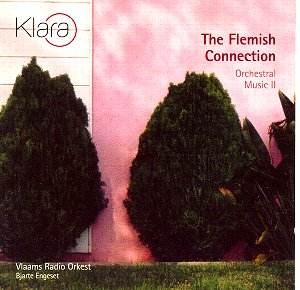Born
in Paris to Belgian parents, Michel Brusselmans returned to Belgium
while still a child. He studied at the Brussels Conservatory,
among others, with Edgar Tinel and Paul Gilson. Later he went
back to Paris to work with Vincent d’Indy. He remained in France
for most of his life but died in Brussels in 1960. While in France,
he was hired by the French publishing firm Salabert to compose
music for silent films, which provided him with financial means
that allowed him to devote his time to the composition of his
"serious" output that includes several symphonies, much
orchestral and vocal music. A number of his orchestral works,
such as the symphonic sketches Scènes Breugheliennes
heard here, were inspired by pictorial or literary sources. Bruegel
the Elder’s paintings inspired several symphonic pieces by Belgian
composers, such as Meulemans’ Peter Breugel (1952),
Chevreuille’s Breughel, peintres des humbles Op.82
(1963) – a new recording of this beautiful work is long overdue
– or Sternefeld’s impressive Second Symphony. Brusselmans’ attractive
suite is in five short sections inspired by the various moods
depicted in Bruegel’s paintings rather than by any specific paintings.
Whiffs of Flemish folk songs as well as folk like original tunes
abound in this colourful, superbly crafted piece, full of nicely
atmospheric touches, in turn joyous, dreamy or overtly rumbustious
as in the final Kermesse flamande.
In
1907 Flor Alpaerts composed some incidental music for Wilde’s
play Salome of which Salome’s dance of the seven
veils heard here. Alpaerts conceived it as a set of seven
short variations on an appropriately languorous theme. The whole,
however, has very little of Strauss’s white-heat passion and sensuality
though it is, as ever, superbly crafted.
The
music of Lodewijk Mortelmans is, I think, the perfect example
of the typical progress followed by many Flemish composers of
his generation (and even of later generations). His early music
is still much indebted to the then prevailing Romanticism whereas
his mature music often leans towards Impressionism. In 1893 he
composed a piece for harp and strings Lyrisch gezang
("Lyrical Song") which he later re-scored for small
orchestra and re-titled as Lyrisch gedicht ("Lyrical
Poem") heard here. Broad, sweeping melodies, sometimes bringing
Elgar to mind, characterise this fine, Romantic work of great
melodic charm.
Renaat
Veremans was a prolific composer, mainly of choral music. He nevertheless
composed several symphonies as well as several orchestral pieces
such as Nacht en morgenontwaken aan de Nete ("Night
and Dawn on the Nete") composed in 1957 and dedicated to
the memory of the Flemish writer Felix Timmermans with whom Veremans
regularly travelled to Antwerp to hear Wagner’s music which both
admired. The Nete is the river flowing near Lier where Veremans
and Timmermans lived. This symphonic poem falls into two main
sections: an atmospheric, impressionist Nocturne and a bright
Dawn section building-up towards a dazzling conclusion. Again,
the music is a mix of Impressionism (in the Nocturne) and of late
Romanticism (in the impressive Dawn section) which is so characteristic
of some Flemish music.
Now,
I must admit that both Frank van der Stucken’s name and music
are completely new to me. Jan Dewilde’s excellent notes tell us
that he was born in Fredericksburg (Texas) to a Flemish father
and a German mother. The family came back to Antwerp when he was
still a child. He began his musical studies in his hometown. He
later went to Leipzig where he studied with Carl Reinecke and
befriended Grieg. He became Kapellmeister in Breslau and, in 1884,
came back to Antwerp. There he conducted much American music (so
we are told but I wonder which works he may have conducted), which
probably led to his appointment as conductor of the Cincinnati
Symphony Orchestra, which Eugène Ysaye also conducted much
later. However, in 1883, he met Liszt in Weimar. Liszt supported
the young composer in setting-up a concert entirely devoted to
the music of van der Stucken. The Sinfonischer Prolog zu
Heinrich Heines Tragödie "William Ratcliff" Op.6
was performed during this concert. This is by far the weightiest
and the most ambitious piece in this programme (it plays for nearly
half an hour). Not unsurprisingly, the music is in the big Romantic
mould, influenced by Liszt and Berlioz. There are many arresting
orchestral touches. One of the most remarkable of these is the
Prelude in which superimposed layers of sound, which the composer
describes as rhapsodische Klänge, create a queer,
uneasy and menacing mood. After this ambiguous, indeterminate
introduction, the music sets out to depict the various moods of
Heine’s drama to which the composer responds with some vivid orchestral
gestures. On the whole, this powerfully impressive piece may be
a bit too long for its own sake, but is quite an achievement by
a composer still in his early twenties.
This
second volume sets forth the pattern initiated in The Flemish
Connection (KLARA MMP 024, also reviewed here), though it
more overtly focuses on composers whose music was still clearly
indebted to Romanticism, though some of them were to look elsewhere
later. All these pieces – new to the catalogue, if I am not mistaken
– are all well worth having and definitely well worth more than
the occasional hearing, which makes this finely played and well
recorded release a welcome and desirable disc.
Hubert
Culot

![]() Vlaams Radio Orkest; Bjarte
Engeset
Vlaams Radio Orkest; Bjarte
Engeset ![]() KLARA MMP 029 [72:19]
KLARA MMP 029 [72:19]